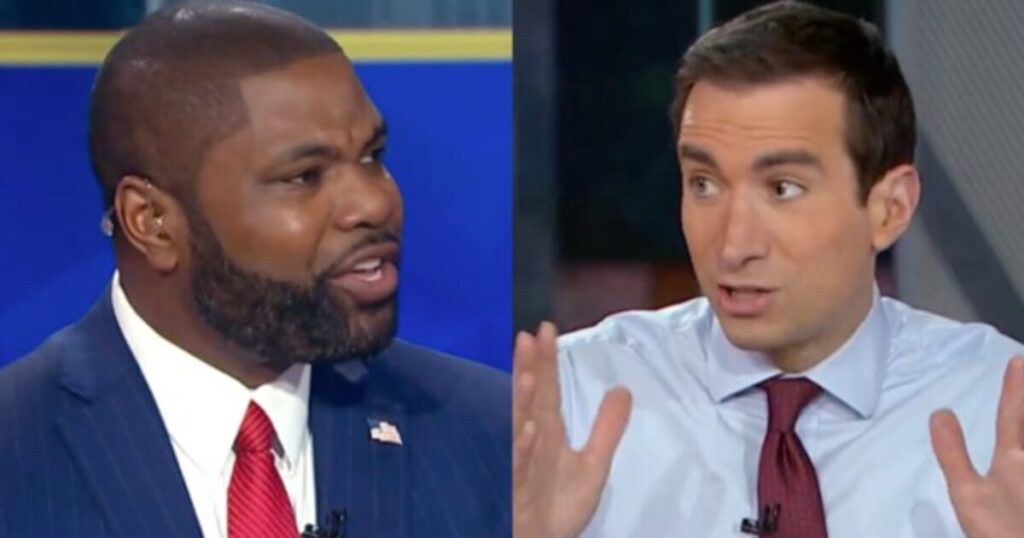Rep. Byron Donalds (R-FL) recently demonstrated the strength of his rhetorical abilities during a contentious appearance on CNBC’s Squawk Box, where he faced off against host Andrew Ross Sorkin. The discussion centered around President Trump’s rally at Madison Square Garden, but the tone quickly shifted when Sorkin pressed Donalds about offensive remarks made by comedian Tony Hinchcliffe regarding Puerto Ricans and other Hispanic communities. Hinchcliffe’s disparaging comments portrayed Puerto Rico as a “floating island of garbage,” and included vulgar jokes about Hispanic culture. This led Sorkin to insinuate that Trump and his supporters were complicit in such bigotry, while he attempted to absolve prominent Democratic figures, including Vice President Kamala Harris, of any similar inflammatory rhetoric.
In response, Donalds deftly countered Sorkin’s claims by highlighting the hypocrisy of liberal criticism. He pointed out that Democrats frequently leverage hyperbolic and hostile comparisons, such as likening Trump and his supporters to Adolf Hitler and Nazi Germany. This marked a stark contrast to Sorkin’s assertion that vitriol was absent from Harris rallies. Donalds challenged Sorkin’s view by asserting that Harris often invokes Nazi comparisons, feeding into the very narrative he suggested was lacking. The exchange underscored a broader issue of media bias, with Donalds accusing the press of magnifying the out-of-context remarks of a comedian while ignoring pressing issues faced by the Puerto Rican community under the Biden-Harris administration.
As the debate pressed on, Donalds made a passionate case for focusing on substantive policy discussions rather than getting sidetracked by isolated comments from entertainers. He criticized the current administration’s handling of economic and immigration issues, specifically pointing out that Puerto Ricans are grappling with painful inflation and ineffective border policies. Donalds emphasized that these are the real jokes affecting American lives, diverging from the transient outrage over comedic jokes. His incisive remarks served to illuminate systemic challenges rather than allow the conversation to linger on fringe comments.
Throughout the interview, Sorkin attempted to redirect the conversation back to the comedian’s comments, showcasing a clear intent to frame the discussion around perceived racist attitudes within the Republican Party. However, Donalds skillfully steered the narrative back, forcing Sorkin to confront the lack of accountability among Democrats regarding their rhetoric. The Florida Congressman’s unyielding approach illustrated a broader Republican strategy to counteract liberal framing by focusing on actions and results rather than inflammatory statements that may only serve to stir division without addressing the realities on the ground.
This dynamic exchange is emblematic of the ongoing political discourse, where media figures often take advantage of incendiary remarks to critique political opponents. Donalds’ performance on Squawk Box revealed not only his quick wit and command of the issues but also a renewed sense of purpose among Republicans to challenge mainstream narratives. His arguments resonate with many who are tired of being labeled based on the actions of individuals who may not represent the broader party ethos. This underlined a significant theme in contemporary politics—how messages can be manipulated to create misleading narratives and how effective communication can counter those narratives.
Ultimately, Donalds’ confrontation with Sorkin exemplifies a vital battleground in current American political discussions, where verifying facts and contextualizing statements can elaborate on the real impacts of policy rather than sensationalize rhetoric. Through such encounters, figures like Donalds are not only shaping the conversation but are also pivotal in redefining how the Republican Party engages with criticisms, advocating for the importance of focusing on substantive issues that directly impact constituents rather than permitting the narrative to be dominated by superficial soundbites and comedic misfires. This reflects a strategic recalibration within the party, aiming to leverage difficult conversations around issues while dismissing distractions that do little to provide equitable solutions or improvements for the American people.

